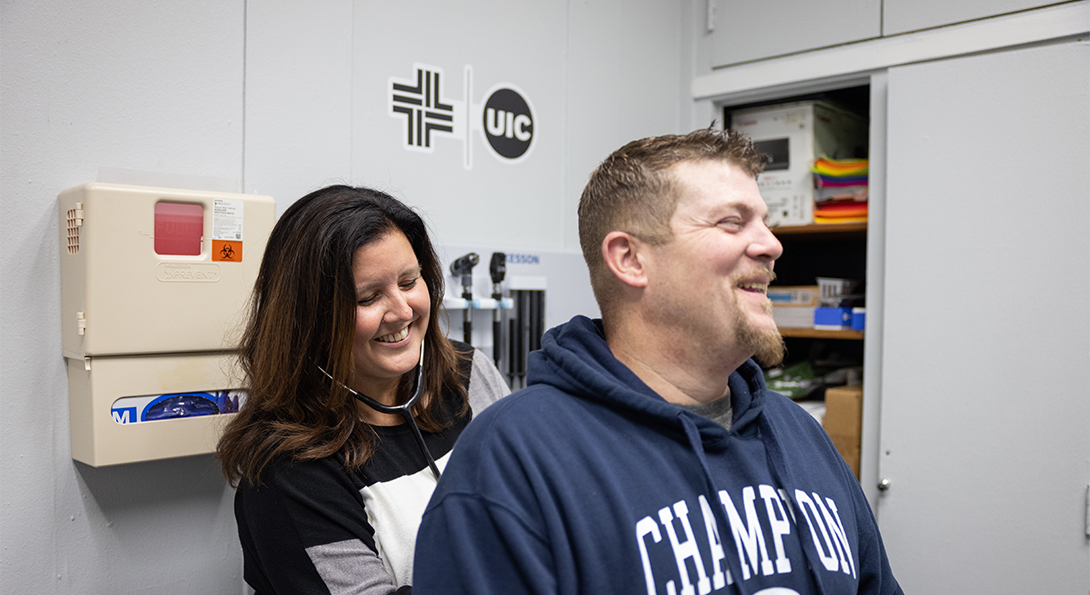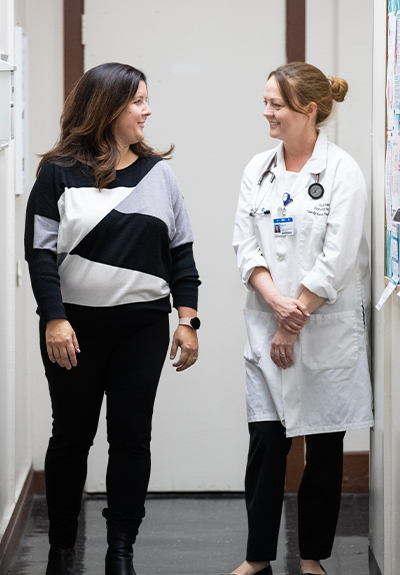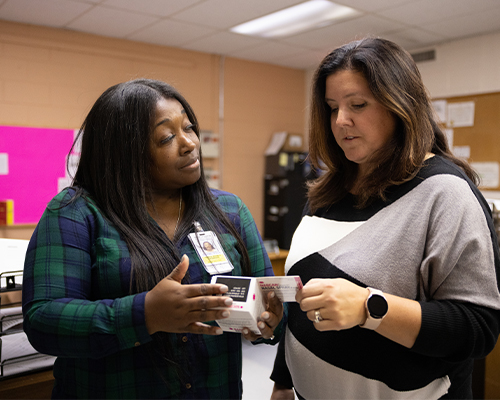Smoothing the transition

A partnership between UIC Nursing and Safer Foundation’s Adult Transition Centers (ATC) mean that men transitioning out of the Illinois prison system no longer need to rely on the emergency room for routine medical care.

Today, Nurse Amy is in.
She will have a steady stream of visitors to her office, a retrofitted storage room with an exam table in this 110-year-old former YMCA building. The door — overhung with a small sign that reads, “Nurse” — is open.
For the last three years, Amy Johnson, PhD ’18, RN, a clinical assistant professor at UIC Nursing, has provided new resident health intakes and follow-up for every man who arrives at two Safer Foundation Adult Transition Centers in Chicago. That adds up to hundreds of men. Some arrive at her office after having been imprisoned for a year or less, while others have been incarcerated for 25 years or more.
“When Amy first came on board, it was almost like a godsend,” says Bobby Moore, center supervisor for the North Lawndale Adult Transition Center. “It’s just been the best thing ever.”
Johnson spends one day a week here at Crossroads Adult Transition Center (ATC) in the North Lawndale neighborhood of Chicago. It’s home to about 170 men who are nearing the end of their prison sentences and are transitioning back to community life. Johnson also spends one day each week on site at the North Lawndale ATC a few blocks away, home to about 150 men.
UIC Nursing clinical assistant professor Kelly Vaez, DNP ’16, MS ’06, FNP, joined Johnson about a year-and-a-half ago under a grant to provide medication assisted treatment (MAT), which helps reduce a person’s dependence on opioids and alcohol. She spends half a day at each transitional center every week.
Building Trust
Andre Martin, the Crossroads program manager, says previously there was no medical staff on site, which meant every time a resident had a medical need — even if it was for something as minor as a prescription refill — staff would take them to the emergency room.
“When you think about the headache of having to go through all that — for the [residents] and for the staff — that has definitely been curbed,” he says.
Johnson adds that the partnership fulfills a major mission of UIC Nursing: providing care to vulnerable populations and critical educational opportunities for students.
When compared to the general population, men and women with a history of incarceration are in worse physical and mental health: 44% more likely to have a mental health disorder, and more likely to have high blood pressure, asthma, cancer and infectious diseases, according to a U.S. Department of Health and Human Services Healthy People 2030 report.
“This is a forgotten population,” Johnson says. “We’re trying to minimize gaps in their health care and stem a bigger problem of overusing the ER.”
Johnson says that many of the men here have inadequate health literacy. This may be the case if they’ve been incarcerated for many years or were imprisoned when they were teenagers. Some have less than a 12th-grade education. They may not know how to refill a medication or even how to make a health care appointment. Worse, they may have had negative experiences with health care in the past and don’t trust the system, Johnson says.
In a setting where authority and formality are emphasized, and other staff member at the transition centers use formal “Mr.” and “Ms.” titles, Johnson and Vaez choose to be known by their first names to create an atmosphere of comfort.
“Building that trust on site has really helped [residents] continue with their appointments [after they are fully released and] in the community,” Johnson says. “This ‘in-house’ connection to community providers bridges that trust gap.”
Partnership Beginnings

Johnson previously worked at the Winnebago County Jail and the DeKalb County Jail. When she joined the UIC Nursing faculty in 2018, she started bringing traditional BSN undergraduate students in the community health course to the transition centers, periodically, to provide health care education and blood pressure screenings.
Smoothing the transition
A partnership between UIC Nursing and Safer Foundation’s Adult Transition Centers (ATC) mean that men transitioning out of the Illinois prison system no longer need to rely on the emergency room for routine medical care.
Her role expanded as Johnson and leaders at Safer Foundation recognized an opportunity for a partnership. Under a Human Resources and Services Administration grant, Johnson developed the current wellness clinics that center an RN as leader in the residents’ health care management. Johnson also created a telehealth connection with nurse practitioners and other specialists at UI Health’s Mile Square Health Center to address the residents’ needs when they fall outside the RN’s scope of practice.
During the COVID-19 pandemic, this pathway was especially helpful.
“I can remember during COVID, when we were doing teleconferencing, everyone else was shutting down and struggling, and we had a level of continuity that just didn’t exist in a lot of places,” Moore says.
Avoiding Temptation
At the transition centers, residents are gradually given more independence during their stays. During the first 30 days, they aren’t allowed to leave by themselves. But as they stay longer, they can get passes to go to work, stores, medical appointments, or even to visit family.
On a Wednesday in October, one of the visitors to the nurses’ office is Andrew, stopping by to request a prescription refill. [UIC Nursing is not using the residents’ last names to protect their identities.] Andrew, who wears a sweatshirt and khaki pants, was released from Jacksonville Correctional Center after serving about two years. He works doing maintenance for Safer Foundation buildings and is helping to build a food pantry.
“This is way better than being in prison,” says Andrew.
After Vaez promises to call in his refill, Andrew explains that she’s helped him get on suboxone, a medication that helps to reduce a patient’s dependence on opioids.
“Here in the world again, back from being behind bars, there’s a lot of temptation,” says Andrew. “Being on the medicine, it helps with the cravings. When I first got here, there was probably stuff I would’ve gotten into that I shouldn’t have.”
After Andrew’s visit, Tyrice stops by for a blood pressure check. Vaez provides education on keeping blood pressure in a healthy range — including lifestyle modifications and medications — and suggests that he come back again so she can get another reading and see if the number remains consistent.
“I’ll be here next Wednesday,” she says. “Stop by.”